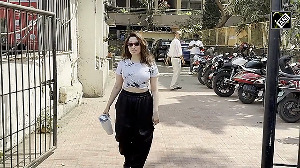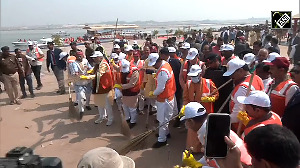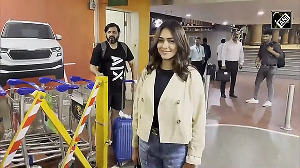Germany has proved it can stage the world's biggest soccer tournament. Now it needs to show that it can also host a party for more than a million foreign visitors.
With a year to go before the World Cup kicks off in Munich on June 9 2006, the big challenge left for organisers is to make the tournament a festival for fans from around the globe.
The serious business of organising the month-long, 64-game event has been a breeze for Germany.
The 12 stadiums are in place, a 4.5-billion-euro ($5.52-billion) programme of investment in transport is running on time and a security blueprint has already been agreed.
In contrast, the public relations work has been a disaster ever since Germany was awarded the finals in July 2000 after a controversial vote.
The country's football authorities have been dogged by scandal, including a corruption case involving one of the showpiece venues and the Robert Hoyzer match-fixing affair.
The World Cup mascot, a life-sized puppet lion with a gormless expression, is widely derided in Germany, while recent outbreaks of hooliganism have raised fears that the tournament will be ruined by violence.
Franz Beckenbauer, chairman of the local organising committee (LOC), gave a call to attention in February after referee Hoyzer had confessed to fixing league and cup matches in return for money.
"The last six months have been a disgrace," Beckenbauer said. "We've been virtually incapable of action."
VENUES TESTED
That looked a harsh assessment, given that work has continued smoothly throughout the Hoyzer scandal.
The Allianz Arena in Munich, the venue for the tournament's opening match, was completed from scratch in just two-and-a-half years and won countrywide applause when it staged its first big match at the end of last month, a clash between Bayern Munich and the German national team.
The remodelled Olympic Stadium in Berlin, which will host the final, was re-inaugurated last year and its recent handling of the German Cup final with a 74,000 full house was faultless.
The rest of the venues are either finished or close to it and five of them will be road-tested during the Confederations Cup from June 15 to 29.
Barring any major organisational problems thrown up at that rehearsal tournament, the progress already made means Germany can spend the 12-month build-up to the tournament improving its image rather than fretting over logistics.
The key goal will be to promote Germany's attractions as a tourism and business destination and Interior Minister Otto Schily signalled a big push on the PR front with a recent speech in Berlin.
"Germans can be cheerful, although to date this is not something we are known for abroad," he said.
"The target group for this service campaign includes anyone who will have anything to do with World Cup 2006 guests -- from taxi drivers, via hot dog sellers, through to hotel staff.
"Germany must impress people through its willingness to help and [the people's] friendliness...For this reason we are planning a strong marketing campaign for Germany as a business location."
FOOTBALL SHIRTS
The cities are also doing their bit to shake off stereotypical views of Germans as hard workers with little talent for enjoying themselves.
On Thursday, the people of Hamburg are being asked to wear the shirts of their favourite football teams to work or around town to mark the start of the 365-day countdown to the finals.
To help communication, taxi drivers and other service workers are being offered English classes.
And at long last, plans are in hand to get Germany into party mood for the tournament.
Towns and cities across the country will show matches on big screens for fans without tickets, a plan made possible only when the television rights holders cut a deal with the LOC earlier this year.
Crucially, those events will not be restricted to tournament sponsors and partners when it comes to offering refreshments, meaning that German beers, and not just the official brew, the American Budweiser, can be served.
That should serve to give the tournament an authentically German flavour, even if the hot dog vendors are speaking English.








 © 2025
© 2025